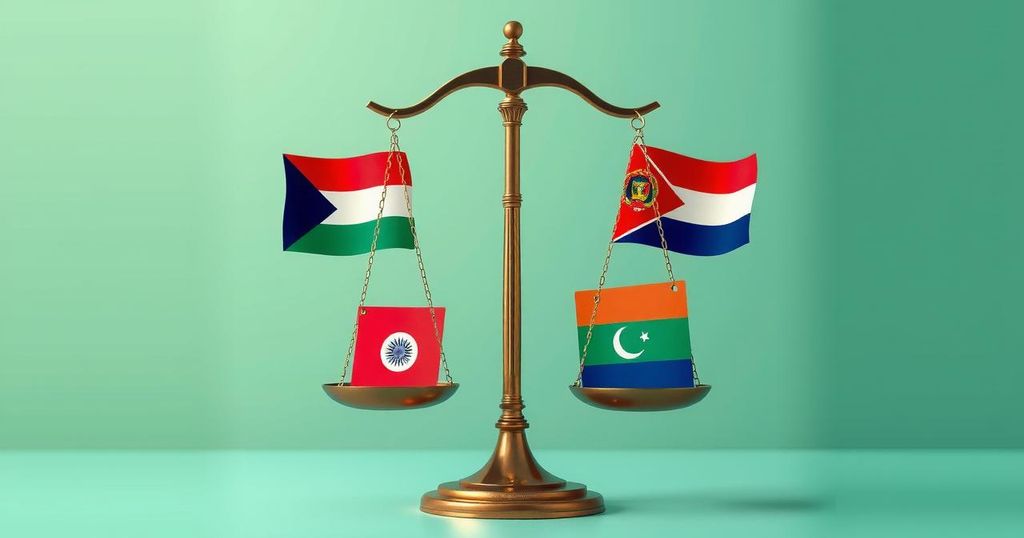Global news
AFRICA, ASIA, HUMAN RIGHTS VIOLATIONS, HUMAN RIGHTS WATCH, HUMANITARIAN CRISIS, ICJ, INTERNATIONAL COURT OF JUSTICE, INTERNATIONAL LAW, OMAR AL - BASHIR, RAOUL WALLENBERG CENTRE FOR HUMAN RIGHTS, SEXUAL VIOLENCE, SUDAN, UAE, UNITED ARAB EMIRATES, WAR CRIMES, WEST DARFUR, YALE UNIVERSITY
Fatima Khan
0 Comments
The Importance of Global South Support for Sudan’s Case Against the UAE
Sudan has filed an ICJ case against the UAE for complicity in genocide via support for the RSF, linked to atrocities against the Masalit. This case is essential for the Global South to uphold international law principles and combat selective justice. Solidarity for Sudan is vital to counter regional exploitation and reinforce global accountability.
The International Court of Justice (ICJ) has announced Sudan’s proceedings against the United Arab Emirates (UAE) for complicity in genocide due to the UAE’s support for the Rapid Support Forces (RSF). This paramilitary group’s violent conflict against the Sudanese Armed Forces began in April 2023, and Sudan alleges this support amounts to abetting war crimes, particularly referencing the atrocities committed against the Masalit group, reminiscent of past violence in Darfur.
Notably, Sudan accuses the UAE of violating the Genocide Convention by enabling genocidal acts through its support of the RSF. Forensic evidence from esteemed organizations like Human Rights Watch and the Raoul Wallenberg Centre for Human Rights documents the RSF’s systematic violence, including massacres and sexual assaults. Reports reveal the extensive destruction of villages, while witness testimonies highlight ethnic targeting in the killings, further illustrating genocidal intent.
The ICJ case against the UAE is backed by substantial evidence, including reports from the United Nations concerning mass graves, and flight data confirming UAE’s weapon supply to the RSF. Investigations suggest that the UAE provided military aid to the RSF, including drones, through covert operations cleverly disguised as humanitarian efforts within a well-established network of support.
The financial might and diplomatic influence of the UAE complicate international responses to Sudan’s case. With a robust economy outstripping Sudan’s, the UAE has leveraged its considerable soft power to maintain alliances with Western nations. Concerns have also arisen regarding the UAE’s past commitments to cease support for the RSF, which seem to have been overlooked, allowing violence to flourish.
Unlike the moral support for South Africa’s ICJ case against Israel, Sudan lacks the same historical backing. However, global indifference and regional exploitation are evident in the current Sudanese crisis. If nations that supported South Africa do not extend similar support to Sudan, it threatens the foundation of mutual support essential to the Global South. It could perpetuate disparities in the application of international law, where justice is selectively administered.
It is crucial to distinguish support for Sudan’s ICJ case from backing the Sudanese government amid its conflict with the RSF, as the Sudanese Armed Forces also hold a contentious record of civilian harm. Efforts must concentrate on ensuring accountability for potential war crimes without excusing the Sudanese government’s failures in humanitarian responses.
The stakes for international justice are substantial. Backing the ICJ case against the UAE could restore the court’s credibility in holding powerful states accountable. Yet, some may argue that the UAE might push legal reservations to evade responsibilities, a move that many legal scholars contest, as it sacrifices the Genocide Convention’s integrity and aims.
Failure to support Sudan could result in a dangerous power vacuum, wherein stronger nations exploit the situation to further their own interests, significantly undermining justice and accountability. Thus, international solidarity with Sudan is imperative not only for addressing past atrocities but for establishing a stronger framework for justice moving forward.
The case Sudan has brought against the UAE at the International Court of Justice for complicity in genocide highlights critical issues surrounding international accountability and selective justice. The overwhelming evidence of atrocities committed against the Masalit and the complicit role of the UAE underscore the necessity for Global South solidarity in support of Sudan. A decisive rejection of this opportunity risks enabling further exploitation and undermining the principles of international law designed to protect vulnerable populations. Hence, it is not merely an obligation but a critical imperative for nations to unify in support of Sudan’s pursuit of justice.
Original Source: foreignpolicy.com




Post Comment